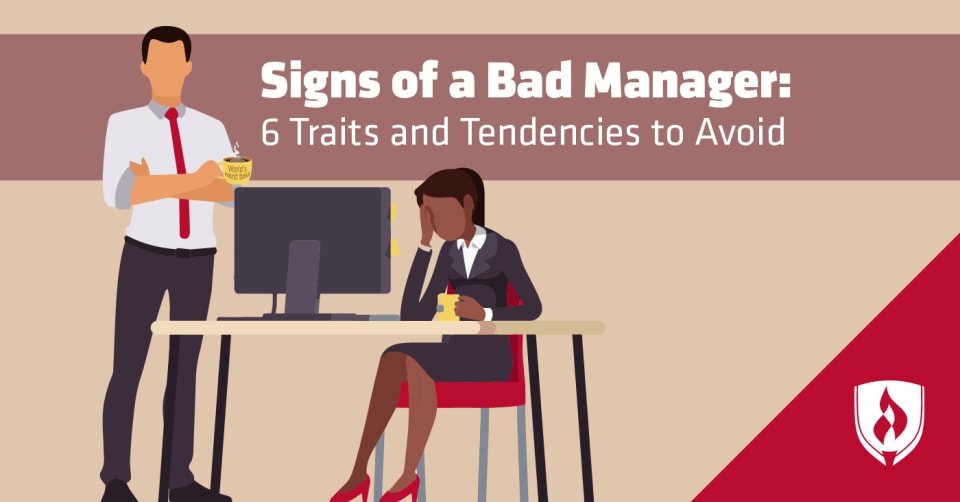
“You wouldn’t believe what my boss said yesterday ...”
You’re used to stories that start like this. Nothing makes a bad work day better like trading workplace horror stories with your friends and commiserating about the amusing—or aggravating—antics of your bosses.
While humor makes for a decent coping mechanism, bad management shouldn’t really be a laughing matter. Managers are responsible for supporting employees and setting the tone for their work environment. There are real consequences for bad management techniques, including low morale, reduced work quality and high employee turnover. A recent Robert Half survey found that about half of professionals have left a job because of what they thought was a bad boss.1
You’ve always thought you’d like to work in management someday, but trading “horrible boss” stories with your friends is giving you cold feet. You don’t want to be the manager everyone complains about at happy hour! How can you avoid the bad manager traits that so many bosses exhibit?
There are some specific traits that bad managers tend to share. Learn all about these signs of a bad manager so you can avoid working for a less-than-stellar boss—or becoming one yourself someday!
Avoid these 6 signs of a bad manager
You have hopes of becoming a manager one day, but the last thing you want is to end up as the butt of your employees jokes in the break room. Here are some things you'd be wise to avoid:
1. Passive-aggressive behavior
People who handle conflict through passive-aggressive tendencies—like avoiding conflict or sweeping problems under the rug, only to be upset about them later—are often thought of as a harmless annoyance. But passive-aggressive behavior can cause serious problems in the workplace.
“A boss who is passive-aggressive is incredibly difficult to work with,” says Dr. Mike Golpa, director of G4 by Golpa. “It creates tension and mistrust because you can never truly trust what they're thinking or saying.” He adds that in a healthy workplace, “you should be able to approach your boss with real concerns” without worrying that they’re silently displeased with you.
How to avoid it: If you struggle with passive-aggressive tendencies, remember that facing conflicts head-on doesn’t have to mean being a confrontational person. You can develop your conflict-resolution skills by practicing with friends and family when problems arise in your personal life. Think of it this way—would you rather your boss tell you up front to change a small behavior or issue that frustrates them, or have it held unknowingly against you? Give employees an opportunity to know your expectations and adjust by speaking directly.
2. Know-it-all tendencies
You probably weren’t a big fan of the teacher’s pet in elementary school, and the same is true of managers who are know-it-alls. Christopher Grozdon, CMO of DASH-SEO, recalls the negative effect of a former know-it-all boss. “This individual interjected during random times to provide their unsolicited opinion about nearly everything that was being discussed. This caused tension among everyone in the company.”
While it’s not the case for everyone, the root of this behavior for some managers is that they’re afraid of appearing incompetent—which leads to overcompensation. The problem with this approach is that managers often supervise the work of experts with specialized skillsets. By acting like they know everything, these bad bosses can get in the way of their talented employees who really are experts.
How to avoid it: Bosses who display know-it-all behaviors need to get comfortable with loosening the reins and allowing others’ voices to be heard. “Don't overstate your opinions to suppress other's valuable contributions,” Grozdon says. “Instead, collaborate and build each other up within a conscious, positive collective effort.”
At a certain point, it’s not about what you personally know as a manager, but how well you’re building up your team to know what you know. If you’re afraid to let go and let your team weigh in because of some perceived deficiency in their abilities, it might be better to ask what you can do to address this in a positive way instead of attempting to carry the load for them.
3. Micromanagement
Micromanagement is one of the most famous traits of bad bosses. These managers spend their days looking over their employees’ shoulders, calling out every minor mistake, dictating the exact way they’d prefer something done and eroding trust with their employees.
“I had a boss that was a complete micromanager,” says Stacy Caprio, owner of Her.CEO. “It made it hard for me to bring new ideas and improve processes in the workplace because he was so inflexible. It also made the work environment anxious and tense.”
How to avoid it: The Harvard Business Review recommends reflecting on why you feel the need to micromanage. Are you insecure about your job performance? Do you dislike feeling out of control? Once you have the underlying reason behind the behavior, you can begin making small changes to your management style so your team can have some breathing room. It’s ok to have standards and expectations for how things are done, but your job is to communicate this to your team and know when to make corrections—and be open to process improvements.
4. Poor listening skills
Listening skills are vital for any team environment, especially managers who want to foster a collaborative workplace. Unfortunately, some managers’ listening skills aren’t up to snuff—and they may not even be aware of the problem.
“[My manager] was convinced he ran a collaborative working environment where everybody had a say. However, he didn’t admit to himself that he would only act on opinions when they aligned with his,” says Ben Taylor, consultant and founder of HomeWorkingClub. “The behavior was really toxic to the company’s atmosphere. Nobody believed that they were being listened to.”
That’s not to say every employee’s opinion or idea is good or feasible—but if there’s no explanation for why that might be the case, it can make employees feel like they’re talking to a brick wall.
How to avoid it: Listening is a skill you can grow like any other. Managers who struggle to pay attention to others’ opinions can practice active listening, a technique in which you repeat back another’s ideas in your own words, consider their thoughts without judgment and provide open-minded feedback that encourages the conversation to continue. Even if a suggestion or idea isn’t feasible in its current form, highlighting and communicating the potential roadblocks or issues it faces could help that employee develop a bigger picture understanding of the organization and refocus their efforts on how to make it work.
5. Narcissism
It’s hard to lead a team when you only care about yourself. Jesse Harrison, CEO at HopeTree Legal Funding, remembers a former boss who exhibited unhealthy narcissistic behaviors. “He had zero interest in his employees as people. He never praised anyone, even if they went above and beyond their job duties for his company.”
Eventually this negative trait led to disruptions in the work environment. “I believe to work with someone, you have to respect them. Unfortunately, this boss made it very clear that he respects nobody but himself. As a result of his narcissism, at least one person was upset at him every day. Employee turnover was very high,” Harrison says.
How to avoid it: While it’s true some managers may just have clinical psychological issues that aren’t easy to overcome, many others are just letting their egos run unchecked. Remember that just because you landed in a corner office doesn’t mean you can ignore the wants and needs of people around you. Spend time getting to know each of the employees you manage, and let them know how much you appreciate their contributions to the team.
6. Authoritarian management style
Some managers think that being the boss means adopting a “my way or the highway” attitude. You’re not really the boss unless you have total control, right? Wrong. This authoritarian management style is actually a sign of a bad manager who isn’t interested in developing trust among team members.
“At my previous place of employment, I had a horrible authoritarian boss. His absolute authoritarian behavior led to a series of other negative behaviors such as the use of fear as motivation,” says Joe Flanagan, lead project engineer at Tacuna Systems. “My boss’s behavior filled the entire workplace with lethargy and stagnation. Our work really suffered.”
How to avoid it: Running your team like a dictatorship will stifle creativity and reduce the quality of employees’ work. Avoid this trap by being willing to accept criticism, listening to others’ opinions and having empathy for your employees. Take a page out of the history books—ruling with an iron fist may be effective for a short period, but eventually the people under your thumb will have had enough and lash out in ways that you can’t control. You’ll be much better off finding a middle ground.
Managing your career path
These signs of a bad manager don’t have to be the default when it comes to supervising a team. Now that you know how to avoid exhibiting these bad manager traits, you might be interested in becoming a boss with strong leadership skills.
Find out how to brush up on the skills you’ll need as a manager with our article, “18 Ways to Improve Your Management Skills.”
1Robert Half Industries, News Release: Half of Workers Surveyed Have Quit Due To a Bad Boss [accessed November 2019] https://rh-us.mediaroom.com/2019-10-08-Half-Of-Workers-Surveyed-Have-Quit-Due-To-A-Bad-Boss




